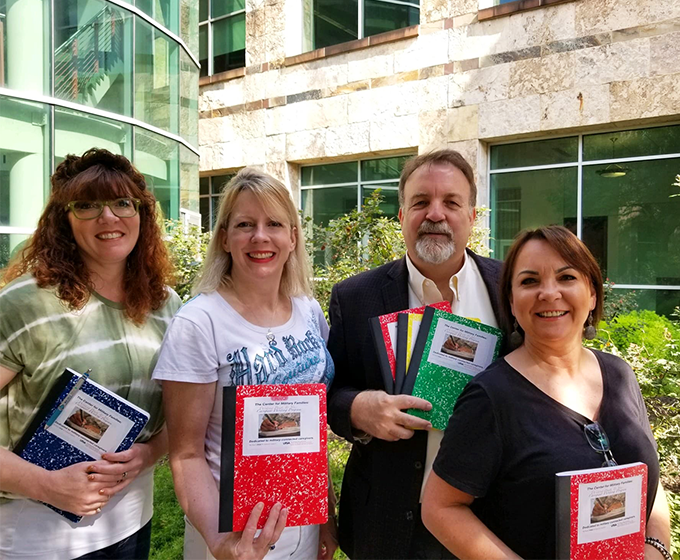
In this photo taken before the COVID-19 pandemic, Writing Back to You group members (from left to right) Colleen Saffron, Donna Dancer, Thomas Porter and Sabine Ward pose with their writing books. Works by Porter, Ward and Dancer's daughter, Sarah, were recently published in On the Move Magazine. Saffron's writing has been previously published in The New Yorker.
FEBRUARY 26, 2021 — The UTSA Center for Military Families has been helping military caregivers connect with each other on a local scale through the Writing Back to You group formed in 2017. Now these military caregivers—family members, friends, or acquaintances who provide care and assistance for former military service members with mental or physical disabilities and illnesses—are connecting with their peers across the country.
With the assistance of Julie Coffey, liaison for the Military Child Education Coalition (MCEC), UTSA’s Writing Back to You group decided to throw off its “cloak of invisibility” and submit stories to the MCEC’s national publication On the Move Magazine. The hope was to forge deep connections to a broad audience of caregivers, veterans and supporters outside of San Antonio.
The group’s stories were accepted and published in the December 2020 On the Move feature "Stories of a Caregiver." The article presents five different perspectives from military caregivers sharing their lives, thoughts and emotions with an introduction written by Thomas Porter, UTSA professor and director of both Writing Back to You and the Blesser Storytelling Project.
These personal stories were written by Porter, as well as former UTSA professor Raquel Cataldo, UTSA student Sarah Dancer, Mission 22 special engagement representative Sabine Ward, and bereaved mother Shalia Ketchell Swaggart. Their tales of devastation, grief, enlightenment and adaptability are each captivating in their own right.
“The UTSA Writing Back to You group is powerful in their words and actions and it shows in these writing pieces,” said Melissa Garcez, senior program coordinator for family engagement and the Center for Military Families. “They are using their experiences to inspire others and to move forward.”
Finding a way forward is what the group has always been about. Carmen Fies, former director of the Center for Military Families, started the Writing Back to You program when she became aware of the need to support this unique population of students. The program gave them a judgment-free space to share the raw truth about their lives and experiences. Since then, this group of caregivers has been meeting regularly to write as a form of self-healing and expression.
“I had lost my sister two days after turning in my dissertation in to the UTSA graduate school in 2017,” Porter recalled. “I was still picking up pieces of my broken heart when Dr. Fies asked me if I would hold writing workshops for military caregivers. Hearing their stories, I knew I was on sacred ground. We found healing in our tears.”
Even through the pandemic, they wrote, shared and contemplated in virtual sessions led by Porter. As stories began to emerge, so did a common theme: caregiving through an unprecedented year like 2020 brought new meaning and purpose to a group that had usually shared their writing in a small setting. Porter added that group member Colleen Saffron, a published writer and multi-talented artist, suggested the theme of invisibility. These published works stressed the importance of making themselves and their loved ones “seen.”
Through efforts like Writing Back to You and others, the Center for Military Families seeks to enhance the daily experiences of military families through the holistic engagement of resources, support, and connection. The CMF is a program through Community Outreach and Transfer Recruitment under the Division of Strategic Enrollment.
Garcez added that she is thankful for national programs like the MCEC and the Elizabeth Dole Foundation that offer excellent support for military caregivers like those in the Roadrunner community. “Military caregivers are certainly ‘hidden heroes’ in our nation,” Garcez said.
UTSA Today is produced by University Communications and Marketing, the official news source of The University of Texas at San Antonio. Send your feedback to news@utsa.edu. Keep up-to-date on UTSA news by visiting UTSA Today. Connect with UTSA online at Facebook, Twitter, Youtube and Instagram.
Move In To COLFA is strongly recommended for new students in COLFA. It gives you the chance to learn about the Student Success Center, campus resources and meet new friends!
Academic Classroom: Lecture Hall (MH 2.01.10,) McKinney Humanities BldgWe invite you to join us for Birds Up! Downtown, an exciting welcome back event designed to connect students with the different departments at the Downtown Campus. Students will have the opportunity to learn about some of the departments on campus, gain access to different resources, and collect some giveaways!
Bill Miller PlazaCome and celebrate this year's homecoming at the Downtown Campus with food, games, giveaways, music, and more. We look forward to seeing your Roadrunner Spirit!
Bill Miller PlazaThe University of Texas at San Antonio is dedicated to the advancement of knowledge through research and discovery, teaching and learning, community engagement and public service. As an institution of access and excellence, UTSA embraces multicultural traditions and serves as a center for intellectual and creative resources as well as a catalyst for socioeconomic development and the commercialization of intellectual property - for Texas, the nation and the world.
To be a premier public research university, providing access to educational excellence and preparing citizen leaders for the global environment.
We encourage an environment of dialogue and discovery, where integrity, excellence, respect, collaboration and innovation are fostered.